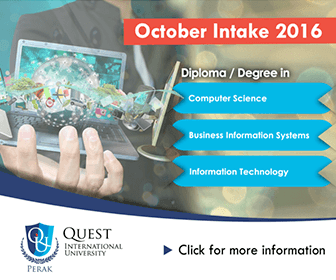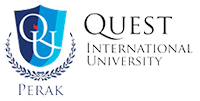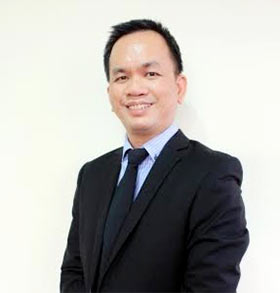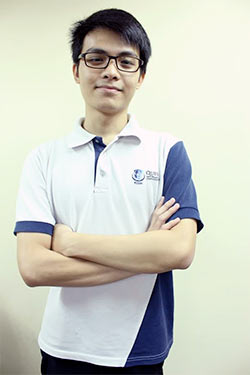Study computer science at Quest International University Perak
by StudyMalaysia.com on September 20, 2016 | Top Stories, Career Guide

Quest International University Perak (QIUP) is a private comprehensive university that makes students their top priority. QIUP believes in engaging their students and instilling in them the hunger of knowledge; QIUP believes in blending theory and practice in education.
The university ensures that their programmes are industry-relevant, and uses motivational teaching methods which are highly effective. QIUP graduates will emerge from the university as florets leaving the plant, ready for the job market and will continue their quest to seek and learn.

The Bachelor of Computer Science (Hons) programme offered at QIUP is a mainstream computing programme aimed at producing graduates capable of managing information and information systems in a wide range of IT environments and in the field of applications development.
One major highlight of the programme is its innovative curriculum that balances theory and application. Students will go through extensive laboratory practise of technical subjects and four months of intensive industrial training that will give them substantial exposure on the techniques used in the IT industry. The project work in the final year of study includes problem-solving case studies that will provide undergraduates the opportunity to apply their knowledge and skills and prepare them for real-world work scenarios.

Want to find out more? StudyMalaysia.com gets up close and personal with Associate Professor Dr Pong Hon Keat, Dean of the Faculty of Integrative Sciences & Technology; and Alvin Hen, third year student of the computer science programme.
A chat with Associate Professor Dr Pong on the Bachelor of Computer Science (Hons) degree

Dean: Associate Professor Dr Pong Hon Keat
Academic qualification: PhD (Nanyang Technological University)
Industry experience:
- Research Fellow at Nanyang Technological University
- Senior R&D Engineer at SolVision Singapore Pte Ltd
- Software Engineer at Creative Technology Ltd
This course was introduced in September 2011. It is a 3-year programme.
2. What are the advantages of studying this course?Graduates of this course have excellent career prospects as their skills are needed in every type of industry. Computing jobs are among the highest paid. Future opportunities in computing are endless in the digital age where computer technology touches almost every aspect of our lives.
3. Can you tell us what students will typically learn in each academic year?What is the total credit hour for this course? The total credit hours for this course is 120. Here’s an example of subjects a student will take.
| Compulsory subjects: | |
|---|---|
|
|
| University courses: | |
|
|
We have eight specialisations for this degree, namely, distributed systems, security, embedded systems, database management, cloud computing, forensic computing, intelligent systems, and software engineering.
5. How are students assessed? How many exams and assignments would they have in a typical semester?Students are assessed through both continuous assessments and a final exam at the each of each semester. The continuous assessment component comprises tests/quizzes, mid-semester examination, and projects/assignments which accounts for 40 to 50 of 100 marks. The balance of the marks is allocated for the final examination. The number of assignments in a typical semester depends on the subjects a student studies in that semester. Every subject typically has one to two individual assignments and some subjects require lab work.
6. Do students undergo an internship? For how long? Which semester? Does the college assist students in securing an internship?Students have to undergo a 4-month internship in semester 7 or semester 8. The university will assist the students if they fail to secure any placement one month before the start of the internship.
7. In your opinion, what type of students would be most suited for this programme Students need to be good in mathematics to study this course.One also needs to have strong analytical skills. Those who are creative will find the programming subjects in this course interesting as they will be taught how to transform their creativity into software applications that can contribute towards changing people’s lives.
8. Why should students choose this course from QIUP?The course was accredited on 30 April 2014 by the Malaysian Qualifications Agency. The graduate employment rate is 100% within the first 3 months after graduation. Students of the programme have been participating in various national and international level competitions. Our students were champions in the IBM Mobilithon 2013. We were second-runner up in the National Hacking Competition 2014. In 2016, we participated in the APEX Business-IT Global Case Challenge 2016 in Singapore and were in the Top 8 out of a total of 18 teams from universities around the world.
9. What is some advice you would give a first-year student?Work hard to survive the heavy study load while adapting to the new learning environment. Join clubs and campus activities to broaden your social circle and enhance your interpersonal communication skills.
10. What is the job outlook like for graduates of this course? What are some of the careers graduates can pursue with this degree? Can you give us some examples of industries or companies that have hired your graduates?Graduates of this course have a great job outlook as they are highly in demand across all industry types. Graduates with a degree can become mobile application developers, software engineers, system analysts, database administrators, or network security experts. Our graduates are being employed in industries that include oil and gas, data storage, telecommunication and software houses.
Alvin’s student experience at QIUP

Student: Alvin Hen Yee Kit
Course: Bachelor of Computer Science (Hons)
Institution: Quest International University Perak
Course duration: 3 years
Current year: Year 3
Country of origin: Malaysia
What I like best about being a computer science student is that I get to learn all kinds of computer terminology, and learn about what I can do with the knowledge from this course. For instance, my job scope, and the possibility and opportunities offered with the knowledge from this course.
2. What made you decide on this programme? Tell us who or what influenced you most.I chose this programme mainly based on my self-interest. I have been exposed to computers since my childhood and became familiar with them. I think my interest was cultivated since then.
3. What’s your favourite subject and why?Generally, my favourite subjects include those with programming where I get to do hands-on coding in class. These subjects give me exposure and creates excitement for my career as a computer scientist. Subjects such as ‘Object Oriented Programming’ have a lot of practical sessions for coding which gives me good exposure and is a great way to learn.
4. What extracurricular activities do you take part in?Tell us more about what you do. I participate in talks and seminars organised by my university which has a wide range of topics – from business to science – which I find interesting and helpful for my own knowledge. Apart from that, I participate and represent my university in competitions related to my course.
5. What’s your best university experience so far?My best experience so far was the time I represented my university in a national competition in Singapore. Travelling is an experience I never get tired of and getting involved in a national competition allowed me to get all kinds of exposure such as experiencing the culture of other students from other countries, acquiring new knowledge and skills, and on top of these, I get to make new friends across the globe. Because this was a university-sponsored competition, we could focus on the competition without worrying about our expenditure for the event.
6. What has been the most challenging thing you have experienced as a university student?As one would expect, meeting deadlines and the expectations of our lecturers are the most challenging things I have experienced throughout the course of my studies.
7. What career do you hope to pursue after graduation?I hope to pursue a career as a developer or a programmer as I am interested in these fields and would like to expand my knowledge on it.
8. What advice would you give someone who is interested in pursuing a Computer Science degree?As a senior in computer science, I would advise my juniors to practice more, particularly in improving their programming skills. Besides that, they should start on all their tasks as early as possible and avoid last-minute work. Getting along with lecturers and friends is vital as they help us along in our course of studies. Lastly, cultivate a hunger towards knowledge.
© Prepared by Webway e-Services Sdn Bhd (StudyMalaysia) September 2016
Related Articles:
- Computing & IT
- Is a career in computing right for you?
- Courses and careers in computer science, ICT and IT
- 10 critical occupations in ICT in Malaysia
- Top 10 computer careers
You May Also Be Interested In...
�Careers in Environmental Protection
![�Careers in Environmental Protection - StudyMalaysia.com]() Environmental science and protection is a field that encompasses a ran...
Environmental science and protection is a field that encompasses a ran...5 Websites that Help Your SPM Revision
![5 Websites that Help Your SPM Revision - StudyMalaysia.com]() Revision at your fingertips — we've come a long way from relyin...
Revision at your fingertips — we've come a long way from relyin...Why you should pursue a TVET education
![Why you should pursue a TVET education - StudyMalaysia.com]() Are you pretty sure of the career you want? Do you prefer to learn by ...
Are you pretty sure of the career you want? Do you prefer to learn by ...Scholarships with March & April 2019 Deadlines
![Scholarships with March & April 2019 Deadlines - StudyMalaysia.com]() Attention school leavers! Applying for scholarships? Check this list f...
Attention school leavers! Applying for scholarships? Check this list f...What
Did you sit for the Cambridge A-Levels in June 2017? We hope you aced ...�Allied health professionals in Malaysia to be regulated under new act
![�Allied health professionals in Malaysia to be regulated under new act - StudyMalaysia.com]() If you’re currently studying a allied health course, do note that a ...
If you’re currently studying a allied health course, do note that a ...






























